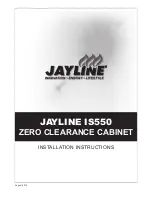
INSTALLATION INSTRUCTIONS FOR MASONRY APPLICATIONS FOR
BOTH UNITED STATES AND CANADA
WARNING: Before starting the installation, the masonry chimney must
be inspected by a qualified chimney sweep.
The following requirements must be followed:
1. The chimney must be absolutely clear of any soot residue or creosote.
Check for cracks, loose or missing bricks that could inhibit correct
installation of the liner.
2. The clearance to combustible must be a minimum of 1” between the
outside of the masonry and any wood framing or loose insulation.
3. The chimney must be built in accordance with the current building
code.
4. No other appliance can be connected to the same chimney.
5. The clearances to combustible for these fireplace connectors are 2”
on the side and bottom and 16” at the top.
6. The connector parts are not necessary if the connection between the
insulated length and the stainless steel liner is done within the masonry
chimney.
Installation:
Rigid stainless liner or stainless flex must be used and listed to UL-1777
for US applications and ULC-S635 for existing masonry or ULC-S640M
for new masonry applications in Canada. The steel rigid or flex liner must
be rated at 2100º F (1100º C).
Follow these steps:
1. Position the fireplace in its location. Temporarily install the 30° insu-
lated elbow on the top of the fireplace and, using a level, mark with an
oval the location where the flue liner will enter the masonry chimney.
2. In the middle of the oval, drill a hole in the masonry chimney at 30º.
3. Increase the size of the hole until a 30º liner elbow can be easily slipped
through.
4. Slide the liner down from the top of the masonry chimney until you
reach the hole level.
5. Slip through the hole a 30º liner elbow and connect it to the liner.
6. Add a small liner section to the other end of the liner elbow which will
allow the liner to extend at least 12” (measured at the top of the liner)
from the masonry chimney.
7. Seal the opening around the liner with high temperature refractory
cement.
8. The next steps must be done in the following order:
See typical installation illustrated below
(Figure 40)
.
A. Select the insulated pipe length that will fit between the 30° insulated
elbow on top of the appliance and the exposed liner so that it will slide
at least 2” over the liner section (You may need to cut the liner for a
better fit).
B. Take that section and attach the pipe to the insulated liner connector
and slide it over the liner. Make sure you have enough opening to be
able to install the elbow without difficulty.
C. Install the 30º elbow on the fireplace.
D. Slide the length section back down on the elbow and twist lock the
two together.
E. Pull the cover down over the length and install the insulation pad over
the liner; be careful to cover the liner completely.
F. Slide back the cover over the insulation and fix it in place using the 3
metal screws supplied.
NOTE: DIAGRAMS & ILLUSTRATIONS ARE NOT TO SCALE.
25
Figure 40
Fireplace
1” Clearance
Insulated
Elbow - SnapPak
for United States,
ASHT for Canada
3 Screws
Insulated Liner
Connector
High-Temp.
Cement
Firestop
Stainless Steel Liner
Insulated
Length
Masonry Chimney,
New or Existing
Liner Must Slide at Least
2” Inside Length
6’ 8”
30
°
Liner Elbow








































